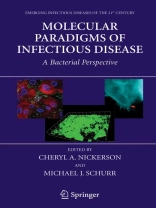Infectious diseases caused by bacterial pathogens are a leading cause of human illness and death worldwide. The study of bacterial pathogenesis has changed dramatically over the last decade, as a result of revolutionary changes in biotechnology and our understanding of molecular and cellular biological systems. This volume is structured to emphasize paradigms of infectious disease that have emerged over the last 10 years and provides a fundamental understanding of the complex cellular and molecular processes that are important for bacterial virulence and the infectious disease process. The book highlights key techniques and methodologies that have driven recent discoveries in bacterial pathogenesis, major structures and mechanisms in bacteria that are important for their pathogenesis, the regulation of these virulence determinants by global regulators, and bacterial biowarfare agents.
İçerik tablosu
Genetic Analysis of Bacterial Pathogenesis.- Genetic Exchange in Bacteria and the Modular Structure of Mobile DNA Elements.- Genomics and the Use of Genomic Tools to Study Pathogenic Bacteria.- Pathogenicity Islands and Bacterial Virulence.- Capsules.- Bacterial Cell Walls.- Mechanisms of Bacterial Adhesion and Consequences of Attachment.- Bacterial Invasion into Non-Phagocytic Cells.- Bacterial Protein Secretion Mechanisms.- Toxins as Host Cell Modulators.- Quorum Sensing: Coordinating Group Behavior Through Intercellular Signals.- The Role of Sigma Factors in Regulating Bacterial Stress Responses and Pathogenesis.- Two-Component Regulatory Systems.- Oxidative Stress Systems in Bacteria: Four Model Organisms.- Bacterial Biowarfare Agents.












